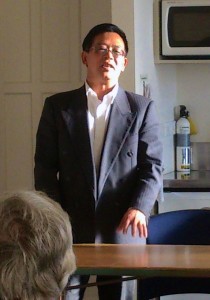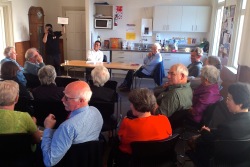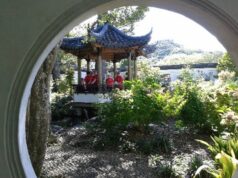
At the last meeting of Auckland branch, Sunday, October 19 2014, Consul Mr Zhang Heqing stood in for Consul General Niu who had accepted an invitation to discuss the “Occupy Central “ protests in Hong Kong. Consul Zhang read Consul-General Niu’s written speech below:
“The so called “Occupy Central” (OC) protest by a small number of people in Hong Kong is in the spotlight currently. The protestors claim to be ‘pro-democracy’ and the purpose of their protest is to “pursue democracy“, “fight for true universal suffrage“, namely, an “unconditional” general election of the chief executive of Hong Kong Special Administrative Region of China in 2017 “in accordance with international norms”.
“Well, really? I beg to ask a few questions:
- Before Hong Kong’s return to China, there had been 31 Governors sent from London. Had the people in Hong Kong ever been consulted on how they were chosen then, let alone voted?
Most of the protestors on the streets are young students and may know little about pre-return days in Hong Kong. But most of the organizers are old enough to remember as well as experience the life then. I beg to ask, who of them had ever pursued the right to nominate or vote on the British Governors? Why are they unhappy now, when the people enjoy the right to vote, one person one vote, [for] their Chief Executive? - Before Hong Kong’s return, laws were imposed on Hong Kong by British authorities thousands of miles away. The Governors ruled with little “checks and balance” and the legislators were merely the “consultants” to the Governors. Had any of the protest organizers ever fought for democracy then? Why are they surprisingly unhappy now, when the Chief Executive respects the Legislative Council which can make laws within the Hong Kong Basic Laws Framework?
- Before Hong Kong’s return, people in Hong Kong were taxed and had to pay for the expenses of British troops in Hong Kong. Had any of the protest organizers protested against the “taxation without representation”? Why are they protesting now, when Hong Kong is exempted of taxes to the Central Government of China and doesn’t have to pay for the expenses of PLA troops in Hong Kong?
- When police forces in Western countries were using violence against “Occupy” protestors, dispersing or arresting them, have any of the “pro-democracy” protestors stepped up and condemned the Western countries for police brutality? Why are they crying out loud “police violence” now, when Hong Kong police are as tolerant as they could be and use the least force necessary?
Furthermore, what is the “international norm” in elections? Is there any country or region that has no requirements for the candidates? Which country could allow someone who publicly denies its Constitutions (sic) to be a candidate? Have such so-called “pro-democracy” protest organizers ever asked other countries to change their Constitutions, or to remove the requirements in their nomination process?
“If they have consistently opposed authority and pursued “true democracy”, they have my respect. Fact is, however, they had been “obedient citizens” when Hong Kong was under colonial rule but started “fighting for democracy” when Hong Kong people have at last become masters of their own and are enjoying democratic rights like never before. Please stop using the word “democracy” to insult people’s wisdom.
“True, it was Hong Kong’s electoral reform that triggered the current “Occupy Central”. Let’s talk about several main factors related to the electoral reform:
Origin of the General Election in Hong Kong: In December 2007, the Standing Committee of the National People’s Congress of China set out a timeline for the election for Hong Kong SAR’s Chief Executive and members of the Legislative Council, making it possible that in 2017, the Chief Executive could be elected by universal suffrage. After then, members of the Legislative Council would be elected by universal suffrage.
The basic principles for the election of the Chief Executive, [are as follows]:
Firstly, the election must conform to the “One Country, Two Systems” policy. That is, it must maintain our national sovereignty, security, beneficial development and must stand for Hong Kong’s long-term stability and prosperity.
Secondly, the election must comply with the Basic Laws in Hong Kong. Articles in the Basic Laws explicitly regulate the method of the election and the Chief Executive’s requirements and responsibilities.
Thirdly, the election must be in line with Hong Kong’s legal position. Hong Kong is a Special Administrative Region (SAR) of China. Therefore, the election of Hong Kong’s Chief Executive is the election of the head of China’s local government. The legitimacy of Hong Kong’s Chief Executive comes from two sources: one is the trust of Hong Kong citizens through a general election and the other, trust from the China Central Government through appointment.
Fourthly, the election must take into consideration interests of all classes and sectors in Hong Kong. Candidates must be nominated by a committee representative of different classes and sectors. The purpose of this is to ensure the equal level of engagement with people from all walks of life in the nomination process.
“Fifthly, the election must benefit Hong Kong’s economic development. Hong Kong is a key international financial, trade and shipping centre. The Chief Executive needs to keep the economy growing and maintain a good business environment. Architects of this election system have got to be realistic and ensure Hong Kong’s long-term stability and prosperity.
“Hong Kong’s electoral reform must be advanced within the boundaries of its laws. Hong Kong is a society ruled by law. Development of its political system should also follow its Basic Laws and decisions made by the NPC Standing Committee. The Basic Law of Hong Kong is the equivalent of [a] constitution for Hong Kong and must NOT be misinterpreted or abandoned.
“There are clear requirements for the nomination of the Chief Executive in the Basic Law of Hong Kong: He, or she, is “to be nominated by the Nomination Committee”. Anything else is a violation of the law. Procedures to amend the election system for the Chief Executive and Legislative Council members are also clearly stipulated in the Basic Law of Hong Kong and by the NPC Standing Committee:
Step one: I The serving Chief Executive reports to the NPC Standing Committee on whether there is a need to amend the election system.
Step two: the NPC Standing Committee replies with a decision.
Step three: HKSAR government submits the proposed amendment(s) to the Legislative Council based on the decision of the NPC Standing Committee. A two-thirds majority of all members is needed to pass the amendment(s).
Step four: the amendment(s) is signed by the Chief Executive.
Step five: the amendment(s) is approved by or registered with the NPC Standing Committee.
Currently, the amendments have completed the first two steps.
“Now we see the protest organizers’ appeals ignore the supreme authority in China, defies the “One Country, Two Systems” policy and violates the Basic Law of Hong Kong and is against the principle of the rule of law.
“The “Occupiers” obstruct public transportation, disrupt public order and hurt public interests. They even claim to besiege the HKSAR government, police headquarters and other public service organizations, challenging the laws brazenly. Their actions are illegal.
“Organizers of the protest exploit young students’ passion for democracy, encourage them to break the law and use them as their tools to achieve their own political objects. They have totally lost the moral high ground.
“Organizers of the protest work with foreign forces to destabilize Hong Kong and hurt Hong Kong’s rule of law and prosperity. By thus doing, they have betrayed the interests of the motherland.
“The Chinese Central Government will, however, unswervingly implement the “One Country, Two Systems” policy and the Basic Law of Hong Kong, and is determined to advance democracy in Hong Kong in accordance with the law. As pointed out by President Xi Jinping: “The Central Government’s fundamental policies in Hong Kong have not changed, and will not change.
“It is a relief to see that the vast majority of Hong Kong people oppose the illegal “Occupy Central” and are eager to restore order and normal life in Hong Kong.
“I wish to assure NZ China Friendship Society that, with a strong leadership of the Chinese Central Government and widespread support for Hong Kong, no one will be able to destabilize or hurt the prosperity of Hong Kong. Hong Kong will have a better tomorrow.”
Any views expressed in this article do not necessarily represent the views of NZCFS

Duncan France, October 2014




